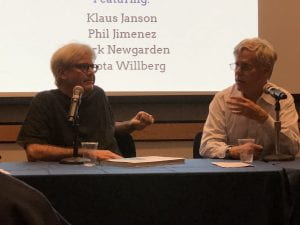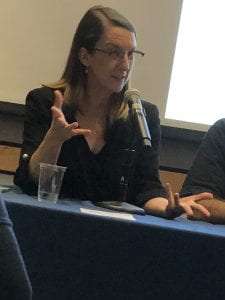Last week on October 3rd, Pace University hosted the Comics & Culture Panel: Those Who Can, Teach.
One of our graduate students, Ayana Underwood, attended and wrote about her experience while there:
I may be slightly biased because anything (literally anything) that has to do with comics is something I’ll never miss—unless I’m dead of course and even then … maybe!
This special event featured:
- Underground cartoonist Mark Newgarden who has worked on projects for Cartoon Network.
- Cartoonist and visual artist Kriota Willberg who creates comics that teaches artists self-care. You can check out the type of work she does here on her blog.
- Comics artist Klaus Janson who worked on Batman: The Dark Knight Returns.
- Writer and illustrator Phil Jimenez who’s worked on Wonder Woman and X-Men. (Ah! The geek in me can hardly contain herself)
The panel was charmingly grilled moderated by, Proffesor Paul Levitz, the former president and publisher of DC Comics.

Left to right: Mark Newgarden and Paul Levitz
The panel engaged in a discussion about how they teach the comic art form to their students. It was really interesting for me because during my undergraduate studies, I had taken a course that was devoted to the study of comics, so it was intriguing to hear each of their perspectives.
Each of the guests agreed on the fact that teaching a comics course without going into some detail about the history of the medium is nearly impossible. Mark had commented that it’s important to “understand how the greats got success.” It’s important to understand what’s already garnered success in the past so we can not only keep finding those masterpieces but to also push those boundaries.
Another topic that came up during the panel focused on how the panelists develop their courses.
Where do they start?
What’s their main approach?

Kriota Wilberg
Kriota noted that what she loves is that she can develop the syllabus all on her own. She teaches NYU’s Graphic Medicine course where medical students actually learn how to make their own comics! I found this fascinating, because as someone with a science background, some concepts can be very hard to grasp from words alone. A lot of people are visual learners, so I think creations like these would be super helpful and more inclusive to all types of learners.
Phil’s approach to teaching his classes is that he makes sure to not have expectations of what his students already know or don’t know. Instead, he prefers to learn what the students do know and go from there so they can get the most out of the class. Phil is all about encouraging his students to be more curious; he believes that by doing this they will find out what their true passions are within the comic world.
Klaus had a different take in which he assumes his students know nothing. He believes there’s “no such thing as inherent talent, only a will to persevere and be the greatest that you can be.” When he walks into his class he’s immediately able to tell which students have that passion and fervor, and it’s much easier to teach those students who know exactly what they want and why they want it.
Another topic that came up in discussion was that while the comics industry thrives on creativity, there are times when experimentation gets stifled. Mark believes that, “the best creative work happens in the beginning of people’s careers,but [eventually] people get paralyzed by the fear of doing something outside of the box.” Klaus expanded on this with a personal anecdote. He’s knows that he’s characterized as an inker with a “gritty style” and because of this he finds that when he wants to experiment with other art styles. He went on to say that comics publishers tend to keep you in those boxes once they see you’re good at one specific thing. It makes sense because that gritty style has become Klaus’ brand, consumers get hooked on that style and that’s what they’ve been paying to continue seeing.
I really enjoyed the panel, but I think the aspect that stuck to me the most was their discussion about the desire to succeed. All of us decided to go into this program to help us accomplish that goal. I’ve noticed how the students in my class are just in love with everything they’re learning—there’s no faking that kind of enthusiasm and it’s truly an amazing environment to work in.
With that said, I left the panel feeling deeply inspired.
